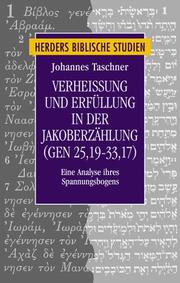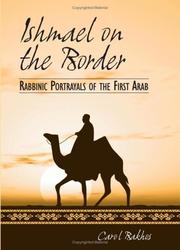| Listing 1 - 7 of 7 |
Sort by
|
Book
ISBN: 0773436707 9780773436701 Year: 2010 Publisher: Lewiston: Mellen,
Abstract | Keywords | Export | Availability | Bookmark
 Loading...
Loading...Choose an application
- Reference Manager
- EndNote
- RefWorks (Direct export to RefWorks)
Book
ISBN: 8801018037 9788801018035 Year: 1981 Publisher: Leumann: Elle Di Ci,
Abstract | Keywords | Export | Availability | Bookmark
 Loading...
Loading...Choose an application
- Reference Manager
- EndNote
- RefWorks (Direct export to RefWorks)
Histoire des des frères ennemis Jacob et Esaü.
Book
ISBN: 0382067959 Year: 1984 Publisher: Morristown Silver Burdett Company
Abstract | Keywords | Export | Availability | Bookmark
 Loading...
Loading...Choose an application
- Reference Manager
- EndNote
- RefWorks (Direct export to RefWorks)
Retells how Jacob stole his brother's birthright by disguising himself in hairy goatskins to deceive his weak-eyed father.
Bible stories --- Old Testament --- Esau (Biblical figure) --- Jacob --- Bible.
Book
Year: 1960 Publisher: Medellin: Interprint,
Abstract | Keywords | Export | Availability | Bookmark
 Loading...
Loading...Choose an application
- Reference Manager
- EndNote
- RefWorks (Direct export to RefWorks)
Adaptation de la Bible en bande dessinée, pour l'Action catholique de l'Archidiocèse de Medelín.

ISBN: 3451273411 9783451273414 Year: 2000 Volume: 27 Publisher: Freiburg Herder
Abstract | Keywords | Export | Availability | Bookmark
 Loading...
Loading...Choose an application
- Reference Manager
- EndNote
- RefWorks (Direct export to RefWorks)
Jacob --- Esau --- Isaac --- Bible --- Criticism, interpretation, etc --- 222.2 --- Genesis --- Esau (Biblical figure) --- Isaac (Biblical patriarch) --- Jacob (Biblical patriarch) --- Īakov --- Israel --- Isrāʼīl (Biblical patriarch) --- Jacob, --- Jakob --- Yaʻaḳov --- Yaʻăqōb --- Yaʻqūb (Biblical patriarch) --- Yiśraʼel --- יעקב --- Isaac, --- Isaak --- Isacco --- Yitsḥaḳ --- יצחק --- יצחק אבינו --- ʻEśaṿ --- עשיו --- Bible. --- Criticism, interpretation, etc. --- Jacob - (Biblical patriarch) --- Esau - (Biblical figure) --- Isaac - (Biblical patriarch)
Book
ISBN: 9780567034731 0567034739 1472550323 0567368254 9780567368256 1322146217 9781322146218 0567103811 9780567103819 Year: 2011 Volume: 556 Publisher: New York T & T Clark
Abstract | Keywords | Export | Availability | Bookmark
 Loading...
Loading...Choose an application
- Reference Manager
- EndNote
- RefWorks (Direct export to RefWorks)
"This study offers a canonical reading of the Esau and Edom traditions, examining the portrayal of Esau and Edom in Genesis, Deuteronomy, and the prophetic material. First, it is argued that the depiction of Esau and his descendants in Genesis and Deuteronomy is, on the whole, positive. Second, it is put forward that Edom is portrayed negatively by the prophets for violating their kin, and for disrespecting the divine apportioning of the lands. Finally, it is suggested that these traditions have resonance with one another based on recurring literary and theological motifs, heuristically framed as brotherhood and inheritance."--Bloomsbury Publishing This study offers a canonical reading of the Esau and Edom traditions, examining the portrayal of Esau and Edom in Genesis, Deuteronomy, and the prophetic material. First, it is argued that the depiction of Esau and his descendants in Genesis and Deuteronomy is, on the whole, positive. Second, it is put forward that Edom is portrayed negatively by the prophets for violating their kin, and for disrespecting the divine apportioning of the lands. Finally, it is suggested that these traditions have resonance with one another based on recurring literary and theological motifs, heuristically framed as brotherhood and inheritance.
Edomites. --- Esau --- Bible. --- Criticism, interpretation, etc. --- Adomim --- Idumaeans --- ʻEśaṿ --- עשיו --- Be-reshit (Book of the Old Testament) --- Bereshit (Book of the Old Testament) --- Bytie (Book of the Old Testament) --- Chʻangsegi (Book of the Old Testament) --- Genesis (Book of the Old Testament) --- Sifr al-Takwīn --- Takwīn (Book of the Old Testament) --- Esau - (Biblical figure)

ISBN: 0791481654 1423795261 9781423795261 0791467597 9780791467596 9780791481653 Year: 2006 Publisher: Albany : State University of New York Press,
Abstract | Keywords | Export | Availability | Bookmark
 Loading...
Loading...Choose an application
- Reference Manager
- EndNote
- RefWorks (Direct export to RefWorks)
Ishmael on the Border is an in-depth study of the rabbinic treatment of Abraham's firstborn son, Ishmael. This book examines Ishmael's conflicted portrayal over a thousand-year period and traces the shifts and nuances in his representation within the Jewish tradition before and after the emergence of Islam.In classical rabbinic texts, Ishmael is depicted in a variety of ways. By examining the biblical account of Ishmael's life, Carol Bakhos points to the tension between his membership in and expulsion from Abraham's household—on the one hand he is circumcised with Abraham, yet on the other, because of divine favor, his brother supplants him as primogenitor. The rabbis address his liminal status in a variety of ways. Like Esau, he is often depicted in antipodal terms. He is Israel's "Other." Yet, Bakhos notes, the emergence of Islam and the changing ethnic, religious, and political landscape of the Near East in the seventh century affected later, medieval rabbinic depictions of Ishmael, whereby he becomes the symbol of Islam and the eponymous prototype of Arabs. With this inquiry into the rabbinic portrayal of Ishmael, the book confronts the interfacing of history and hermeneutics and the ways in which the rabbis inhabited a world of intertwined political, social, and theological forces.
Arabs in the Bible. --- Esau --- Ishmael --- ʻEśaṿ --- עשיו --- ישמעאל --- In rabbinical literature. --- Bible. --- Be-reshit (Book of the Old Testament) --- Bereshit (Book of the Old Testament) --- Bytie (Book of the Old Testament) --- Chʻangsegi (Book of the Old Testament) --- Genesis (Book of the Old Testament) --- Sifr al-Takwīn --- Takwīn (Book of the Old Testament) --- Criticism, interpretation, etc. --- Esau (Biblical figure) in rabbinical literature. --- Ishmael (Biblical figure) in rabbinical literature. --- Ishmael, --- Esau,
| Listing 1 - 7 of 7 |
Sort by
|

 Search
Search Feedback
Feedback About UniCat
About UniCat  Help
Help News
News